‘I prefer them to be alive and shouting at me than dead from a drug overdose’, says needle exchange worker
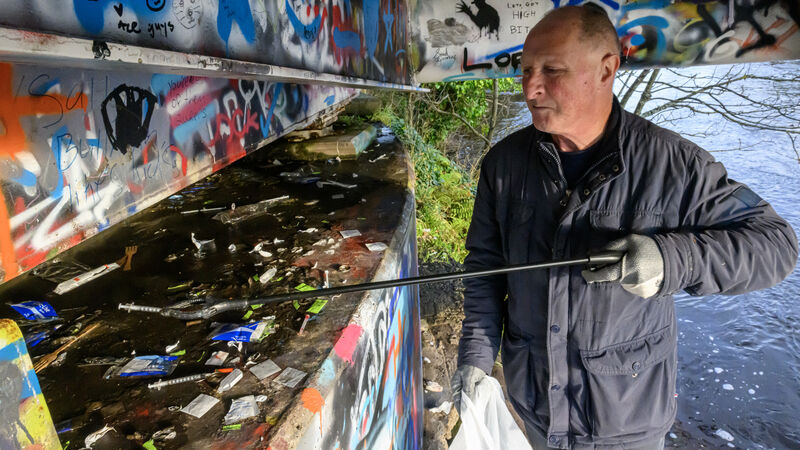
Frank Horgan, of the HSE Drugs Task Force, uses a litter picker to safely dispose of a syringe left under a bridge where users shoot up along the Mardyke Walkway in Cork City. Picture: Dan Linehan
T’S A dismal Monday afternoon in Cork City, and a group of heroin users are gathering to score, jittery with anticipation.
On this occasion, the users’ dealer happens to be late — giving Frank opportunity to check in with some regulars. Many have come to trust him over the years like a friend or older brother. While, some might seem beyond the point of no return, Frank lives in perpetual hope.
The mutual respect between him and the needle exchange service users is palpable. A member of the group speaks about Frank in glowing terms.
John [not his real name] has a heavily stubbled face marked by open sores. His alabaster complexion is slick with perspiration. That intoxicating rush is no more. Sickness has taken hold and heroin is the only antidote.
Acknowledging Frank, he asks: “Frank, how long do you know me now, Frank?” His conversation is tinged with wit and a homely Cork accent.
“I was 18 when I first met Frank,” he tells the . “Now, I’m 36. Frank is a great help to us.
"He’s salt of the Earth, a good old skin. Frank is doing this for so long. He knows me. He knows all of us. Anyone who is using here knows to put needles in a sharps box and Frank is a great help with these things.
"I don’t understand why anyone would throw needles on the ground. What is wrong with people?”
The rest of the group are slow to speak. However, John still introduces us to his younger brother.
“There’s a reporter from the here,” he beckons. “She’s just looking for a bit of news.” Despite a sickly pale appearance, John’s brother’s face colours a shade when I ask about the needle exchange service.
“Me… heroin?” he asks, momentarily startled. “I don’t touch heroin. Anyway, it was nice to meet you. I hope you get your bit of gossip.”
His body language betrays the denial. It later transpires there is a third brother who also frequents these parts.
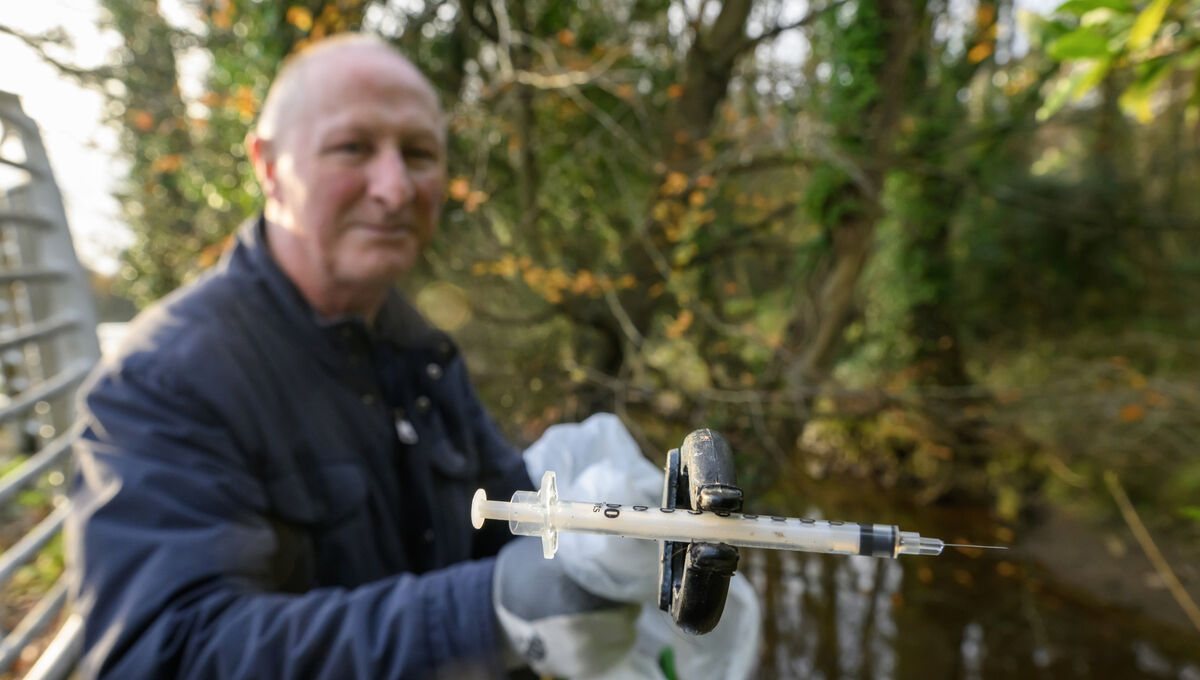
Small victories are the order of the day as one dressing-gown clad lady subtly approaches Frank with a request for a sharps box. It’s a baby step towards what Frank hopes will lead to discussions about potential recovery options.
“I know she’s staying in a hostel,” he says. “At least now I can be sure she’s not sharing needles.”
Frank ensures he is gone before the dealer arrives with their gear. A crossover, he explains, may only serve to undermine trust he has built up with his service users.
“These are the areas where people buy, sell, and use drugs basically,” he says.
"Wherever they buy their drugs they will use them at that spot with many just discarding syringes. The withdrawals can be very severe. As soon as they get the heroin in, it stops them from going through the sickness. They just want to feel normal.”
The Cork native addresses some misconceptions around heroin addiction.
"Trauma is a driving force for addiction. Many view heroin as a good painkiller. When it comes to scoring the drug, it’s all over in two minutes.
"If I see someone who is too sick, I won’t engage. The reality is they are just watching over their shoulder until the gear arrives.”
He describes the withdrawal symptoms in harrowing detail.
“It’s like having the worst kind of flu symptoms come at you. You are sweating profusely with pains all over your body and cramps in your stomach. If you don’t get this into your system, then you are going to have diarrhoea.
"The minute you use, the sickness is gone — which is why a person ends up using all the time. There is no high anymore. All that’s left is using.”
Frank’s role is multifaceted. He is often observed distributing sterile injecting equipment and paraphernalia to reduce the spread of conditions like Hepatitis B and C among drug users.
What people don’t see is the many lives he has saved — some through CPR, others with a simple conversation.
Frank explains how his exchanging of sharps containers and clean needles offers a valuable platform for engagement and the chance to promote recovery services among addicts.
For some, it was a simple cup of coffee with Frank that changed their lives. He is often reminded of these heartening success stories while out and about in Cork.
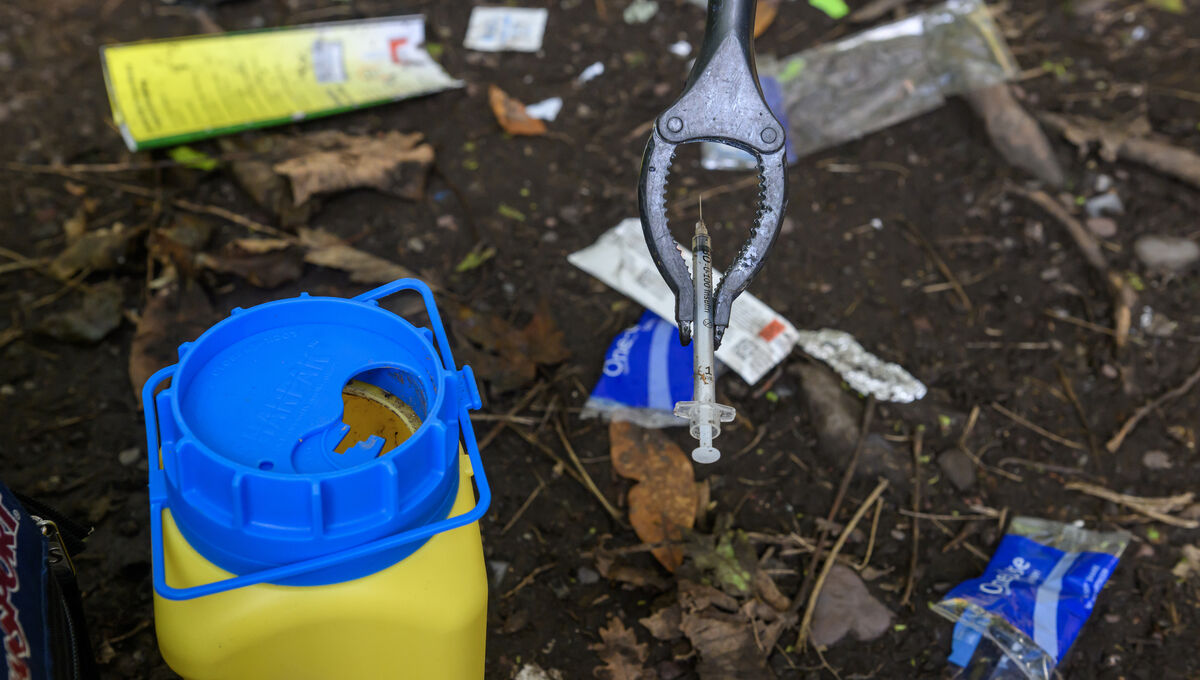
“They’ll tell me 'I’m off everything Frank', but they don’t need to. I can see it in them.”
His efforts are not always met with the gratitude they deserve. Frank remembers being admonished by one man whose life he saved with CPR and the medication Naloxone.
“When they come around, they will just give out to you and tell you that you ruined their whole day because their buzz is gone. But I prefer them to be alive and shouting at me than dead from an overdose,” Frank says.
He reserves judgement, acknowledging the horrific journey those in the clutches of addiction endure. Heroin has driven them to the epicentre of desperation and shame.
“It forces people to do things they don’t want to do,” Frank laments.
Naloxone, which works to reverse overdoses in emergency situations, has been a godsend to people like Frank and others who are working on the frontline of addiction services.
“I remember years ago not having the Naloxone and feeling very under pressure waiting for the ambulance. I’m able to carry it in my bag now. The last time I had to administer it was in Fitzgerald’s Park.
"If I come across somebody who has gone over, I have no way of knowing whether they have been there five minutes or five hours. If you are doing CPR on someone and there is no Naloxone available, you have to just keep going with resuscitation. Anyone who has done CPR will realise how tiring it is.”
So with the obvious horrors involved in heroin addiction, why do people start to use in the first place? Frank explains how the addiction spiral often starts.
“Somebody will try smoking it one weekend and the body will reject it. They’ll just vomit but when they smoke the second weekend, they get the hit. Before they know it, they are smoking once a week. Then it’s Friday, Saturday, and Sunday, and eventually five days a week.
“If you’re coming off it, you need an opioid substitute — but there is hope. I know people who did well and went back to college. They are able to work and function like other people in society.”
As has been well documented, addiction and criminality go hand in hand.
“Some will use once, twice, or even three times a day. Other people use 10 or 12 times. It’s about €25 a bag, so you can imagine how the cost builds up.
"Criminality often comes into it and a lot of things that shouldn’t happen. The desire to get money is sometimes so strong I have to be more careful when working with a client. I can leave my phone down momentarily. You have to use your common sense and understand where they are coming from. Everything turns into an opportunity to get a bag.”
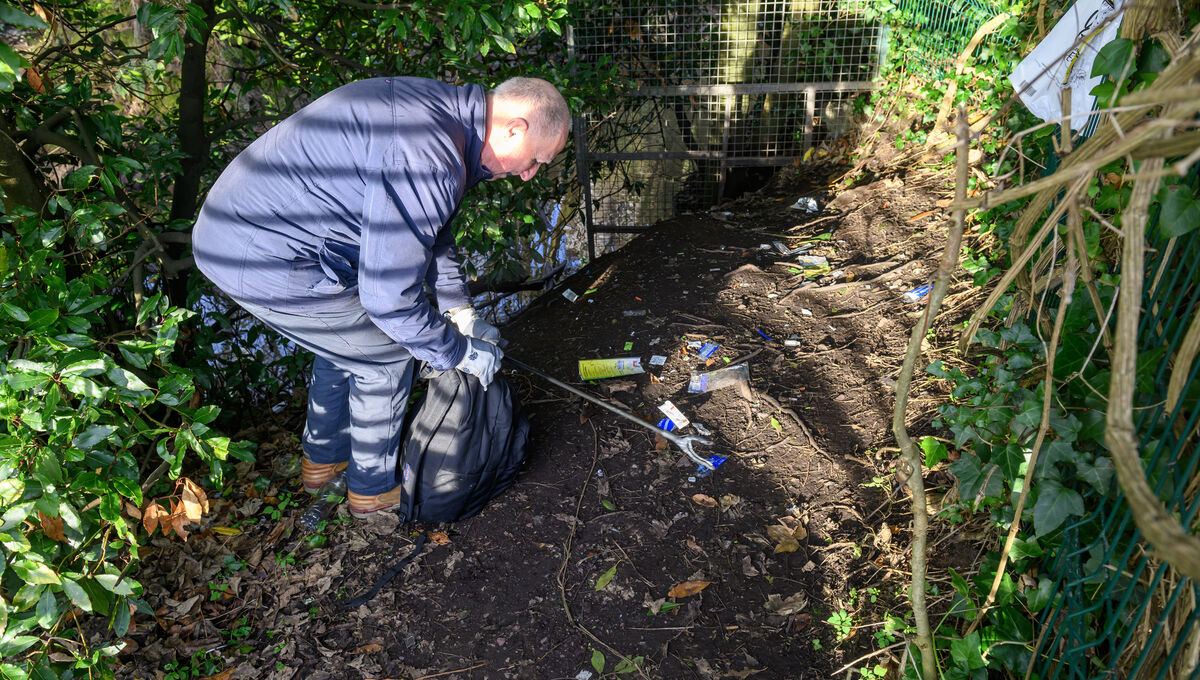
Armed with a litter picker, Frank takes us on a journey through Cork’s underbelly.
One such place is nestled in the heart of a quiet wooded area. Syringes, tinfoil, and spoons are strewn like confetti across the ground. Needles peep out like creatures from the bronze leaves crunching underneath our feet. Frank conscientiously clears the path ahead for us.
A trail made of up of women’s shoes, condoms, hand gel, and deodorant cans stretches out before us. The carefully pitched tent acts as an eery focal point and a reminder that for some rough sleepers this is home.
“I approach this the same way as I would approach anyone’s home,” he says.
“You have to be respectful. If I walk into an area and there is somebody there, I always ask if it’s okay to come in. If they agree, that’s grand. If they have a problem, I’ll leave and come back another time.
"Sometimes people who don’t know me might think I’m a garda or something. They can be very anxious about seeing me. Luckily, I have never been assaulted. People have only ever been respectful. After a while they usually open the door to let you into their lives.”
Shame can prove a strong deterrent for those accessing help.
“What we do is we go into the areas and remove any discarded syringes and engage with people, as well as offer them a service for methadone or Arbour House.
"We’ll find people at these locations and engage with them. It is important to build up a rapport in order to get people in for an assessment and into a stabilisation programme. It is their decision. We’re just trying to offer them a little bit of hope as well.
“People getting abscesses and infections because they’re rushing to inject is common. If we want to complete an initial assessment, we ask questions to find out if they share spoons or needles. You gather as much information as you can with the assessment, and that formulates the care plan and determines whether a person needs to get their bloods checked. There is a lot of high risk involved with injecting.
"When people’s veins collapse, they will always try to find another one or move to high risk areas like the neck or groin. You will always try to get people back smoking over injecting to make it safer — even though there is no safe way of using heroin. If I can’t get them into services, then I will encourage them to do what they are doing without butchering themselves in the process.”
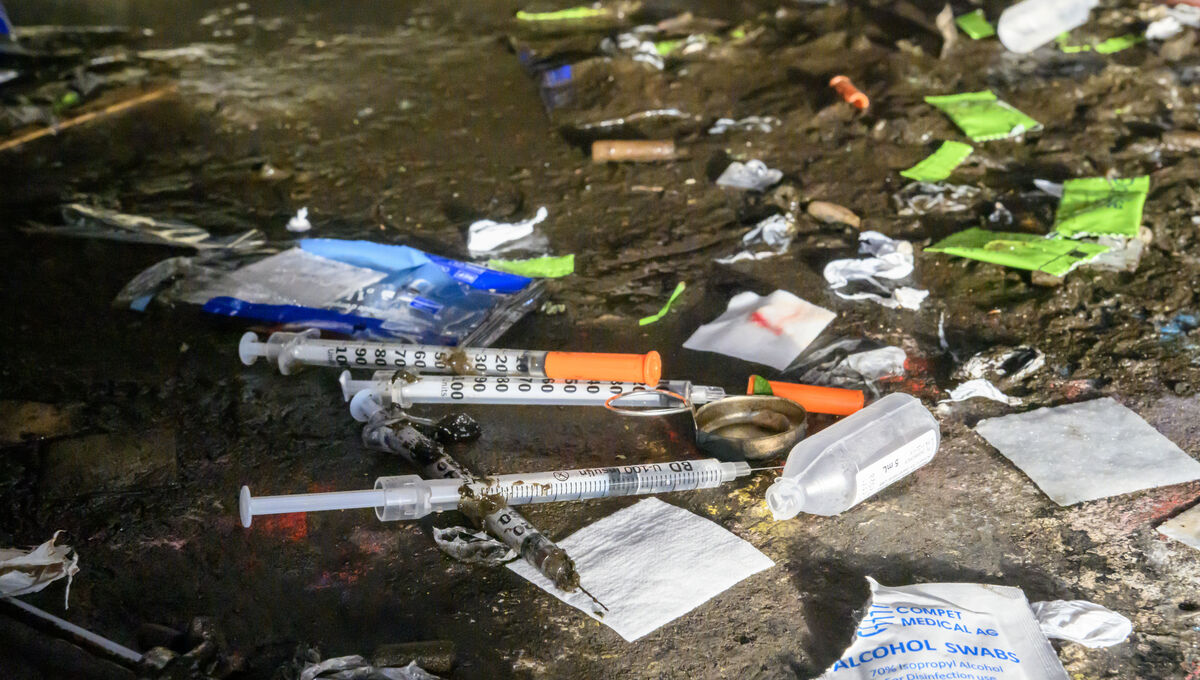
Families regularly reach out to the needle exchange outreach worker.
“A lot of people are looking for Naloxone training. They’ll tell me about a son or daughter at home who is using who they want to be able to administer it to in the event that anything happens.
"We always advise people to have somebody with them if they’re using. If I’m here using, and I’m on my own, nobody is going to find me until I’m dead. A second person can raise the alarm if they go over.
"The problem is that many don’t want others to know that they are using. This comes with the risk of being found dead after an overdose. There are also a number of people in emergency accommodation in Cork who are using. There is about 40 in homeless services alone at the moment.”
Frank’s focus is also on keeping the public safe.
“Sometimes, people will take the syringes with them. Others discard them. You get people who break the needle off and they think that’s safe.
He is pleading with anyone fighting a heroin addiction not to lose heart.
“Some people tell me that I changed their life. However, I have to remind them that they did it themselves. I just helped a little.”
Facilities across Cork including Cork Prison, where Frank provided in-house training in Naloxone administration, have benefited from his knowledge.
Cork City Fire Brigade were the latest to avail of the HSE’s Naloxone training initiative before joining the list of carriers earlier this month.
Meanwhile, the HSE head of drugs and alcohol services in Cork and Kerry, David Lane, described the vital role of needle exchange outreach workers in the community.
“In terms of people’s addictions, we are supporting them in emergency accommodation and treatment services and looking at the wider supports available too. We can deliver initial and comprehensive assessments with people even on the street.
"We look at bringing people into cafes for a coffee to find out what they want in terms of recovery. We find that some people are reluctant to engage with services.
"Over a period of time, you can build a relationship with them. Our two needle exchange outreach workers know lots of people sleeping rough by name.
"They can become very open to learning about supports to break that cycle. It takes time to build trust, especially when they have had a negative experience with the State and the challenges they’ve had in their own lives. It’s all about treating people with dignity and respect.”





